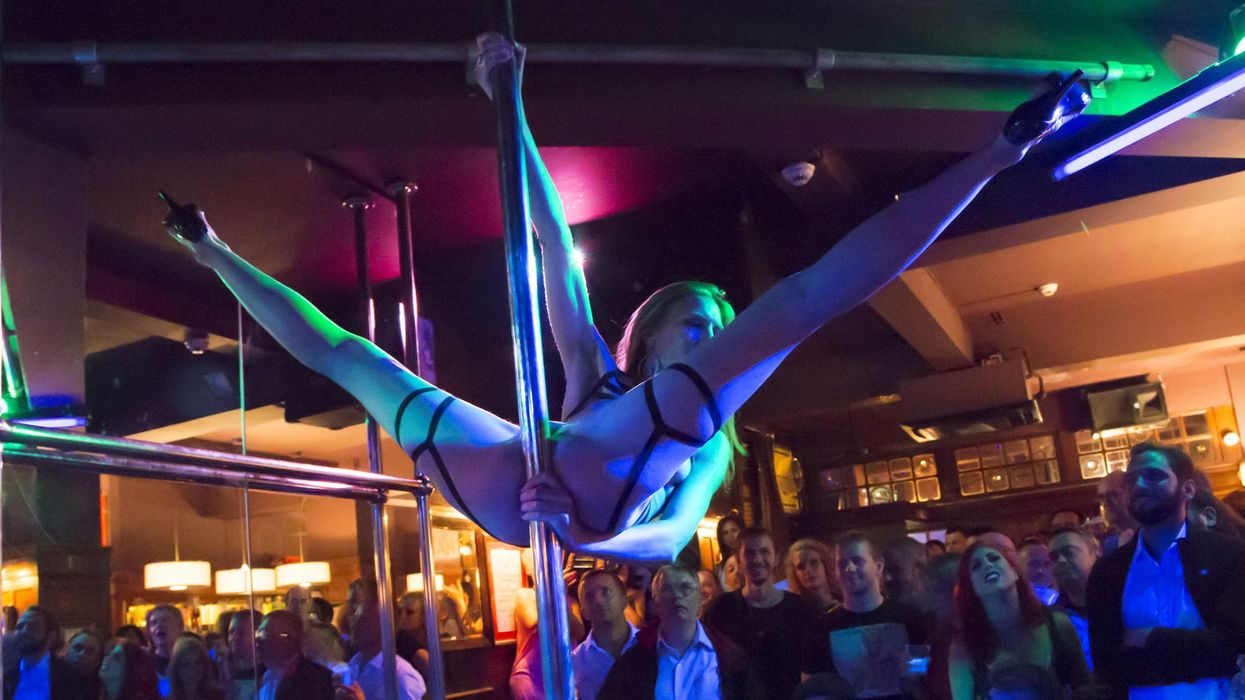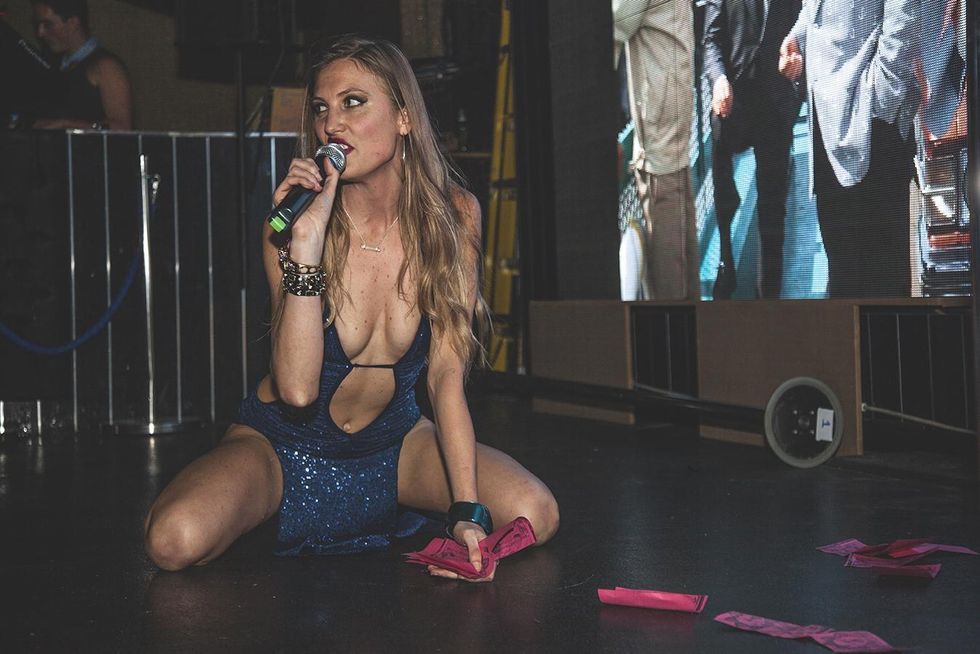News
Jake Hall
May 05, 2018

Photo: Vera Rodriguez
“For me, stripping was a revelation: it gave me financial independence which then gave me more freedom, more choice and more options than I had ever dreamed of as a young woman. To me, that was feminism in practice.”
These are the words of stripper, activist and tireless advocate Stacey Clare, otherwise known as one of the most crucial voices in the ongoing fight for sex worker rights.
Over the course of her 12-year career, she has amassed a wealth of first-hand experience, which she now uses to challenge stigma, expose exploitation and continually mobilise the East London Strippers Collective, which she founded in response to a 2009 law designed to crack down on sex work. Strip clubs were heavily affected by the legislation which, according to Clare, ironically worsened conditions.
“I started working in London in 2010 after a hard-fought battle in Hackney – Hackney Council was actually the first in the UK to try to implement the new laws and close down strip clubs in the borough. After an overwhelming public campaign in support of the clubs, a handful were allowed to remain open.”
But the damage was done. The political lobbying around the issue merely served to intensify stigma and compound harmful attitudes that strip clubs are some kind of threat to society, and that the general public must be protected.
Against this political backdrop, Clare repeatedly saw the strip club industry dragged through a media storm which, she says, resulted in the gradual erosion of workers’ rights. “I decided I needed to take some sort of action, so I organised a dinner party with nine of my colleagues. I proposed the idea of a collective, and it picked up some momentum.”
This fateful party became a catalyst for years of campaigning which earned the activist a 2015 TED talk, as well as an upcoming book – ‘The Ethical Stripper’, billed as an “antidote to stigma, shame and stereotyping” – currently being crowdfunded through publishing initiative Unbound.
It’s not hard to see why Clare is acclaimed. Her TED talk was, frankly, genius; instead of relying solely on a lengthy, unimaginative Powerpoint and cold, hard data, Clare crawled suggestively on-stage to a cacophony of audience cheers. After introducing herself in a coy, breathy voice, she began to remove her heels and tie up her hair in order to prove that strippers are, like all of us, more than just their job role.
Despite her seemingly effortless ability to command a room, she admits that although dancing came easily, due to a wealth of childhood performance experience, the difficult part was developing confidence.
Talking to every customer, flirting, selling a private dance or an hour in VIP, emotional labour, keeping their attention when there’s plenty of competition – that’s the real skill of stripping nowadays.
Undeniably, the nature of the profession has shifted – but details of how and why this shift has occurred rarely come from the mouths of strippers themselves. Clare argues that this has led to a misinformed narrative laced with shame and stigma, one which always pigeonholes sex workers as victims. “It’s much easier to whip up hysteria about the maltreatment of women than it is to talk openly and honestly about the rights and conditions of sex workers,” she explains.
The more we come out in the open, reject that ‘victim’ label and help recontextualise the discussion, the greater chance we have of finding solutions.
Increasingly, this visibility is becoming crucial. The misconception that sex workers are always trafficked is harmful and damaging to those who autonomously choose the industry, but the ultimate problem is that these sensationalist discussions detract from the real issues at hand.
“In the UK, the biggest problem is that the industry is being gradually eroded, and we have little or no recourse to prevent it. The idea that strip clubs are exploitative places is deeply-rooted in public consciousness, and unfortunately it’s a self-fulfilling prophecy – working conditions worsen with every year that goes by.”
She goes on to reiterate that the 2009 Policing and Crime Act did nothing to protect sex workers despite sparking the moral backlash which galvanised Clare in the first place.
“It is true that, as the industry spread during the 00s, the exploitative business model proliferated.”
Strippers have to pay to work, so we don’t get paid a penny by venues. Clubs will charge dancers a house fee each time we do a shift, but there are plenty of arbitrary fees, fines and rules on top of this.
They can use coercive methods to take a percentage of our tips and our earnings from private dances; it’s a great way for unscrupulous managers to make money from its clientele and its workforce alike.
On top of this, dancers are often expected to remain loyal to a club despite being self-employed – she says that anyone caught moonlighting could lose a regular gig.
“We have absolutely no rights as employees. Clubs wash their hands of any responsibilities to us by making us sign disclaimers as independent contractors, yet they treat us like employees – and the permanent threat of being sacked looms over us.”

Legal protection against unfair dismissal is often blocked or difficult to access, as Nadine Quashie discovered when she finally lost a four-year battle against legendary strip club Stringfellows.
Despite apparent progress, the Court of Appeal ruled against her.
Things are no better Stateside thanks to a recent law – FOSTA – which essentially forced sex workers off of websites and back on to the streets. Clare claims that this law makes it much more difficult to forge online communities and, therefore, much harder to organise, share experiences and collectively fight against exploitation. Despite this regression, there is at least a history of strippers winning legal cases against employers in the US – one still lacking in the UK. Instead, workers here are increasingly being forced into the precarious gig economy, which consists of zero-hour contracts and freelance opportunities often unaccompanied by pensions, sick pay or any guarantee of financial stability.
These growing difficulties in securing stable income are undeniably taking their toll, and many women are responding by turning to sex work.
Austerity is having a grotesquely negative effect on women, with women on low incomes in receipt of benefits – most of whom are single mothers – shouldering the burden of tax and benefit cuts.
She backs up this claim by citing a series of shocking statistics: the vast majority of government savings between 2010-2020 will come from women’s pockets, whereas women seeking asylum are being forced to make ends meet with unthinkably tiny budgets. More than one million people in the UK are officially destitute, and four million children are living in poverty.
Approximately 90 per cent of sex workers are women, and the majority are mothers – mostly single mothers. If prostitution policy and law was framed by these facts, we’d get anti-austerity policies and more support for mothers.
Instead, women are being simultaneously punished by a gruelling austerity regime and having their chances of becoming a sex worker – one of their few remaining options – threatened. It’s a combination from hell.
The statistics undeniably show that sex worker issues are also feminist issues.
Despite this fact, so many feminists oppose sex worker rights that they even have their own name – SWERFs. “I think when feminists who don’t have experience of working in the industry try to discuss it, there’s a lot of fear: fear of getting it wrong, of letting down vulnerable women. There are a lot of gaps in public understanding, and I think that prejudice often fills these facts. That isn’t helped by the awful, demeaning representations of sex workers in media – the nuance is removed.”
“There’s also the fact that lot of figures and statistics used to back up ideologies can be spurious, but the stories that come from the industry have value.”
There are stories from both sides: there are success stories as well as harrowing testimonies of some of the worst human rights violations.
There are victims, just like there are people who benefit – there shouldn’t be a dichotomy between who is right and wrong.
Ultimately, the moral framing of sex worker issues is detracting from the fact that they primarily concern women’s rights and workers’ rights.
Clare aims to cut through this noise with ‘The Ethical Stripper’, a book she says strike a balance between hilarious, first-person accounts of her own experiences and the academic “voice of reason”. “I’ll be covering a wide range of topics including financial exploitation, licensing law and sex worker activism, but most importantly, I’ll be looking to take down as many stereotypes as I can.”
Stigma and shaming are, in my mind, the ultimate problem.
I hope, most of all, that this book will make readers question their own views and start being better allies to those of us who need it more than ever.
Top 100
The Conversation (0)













